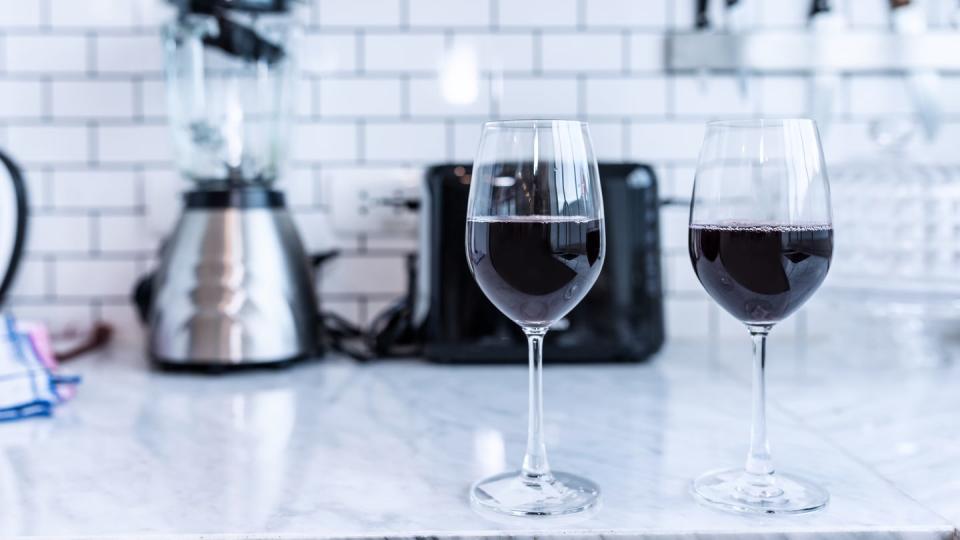How unhealthy is it to drink alcohol every night (even if it's only a little)?

Whether we like it or not, we live in a world where alcohol is deeply embedded into our culture and daily lives; drinking can play a big part in the way we socialise, the way we relax or in the way we 'let loose'. It can be a beer down the pub, a glass of wine on the sofa after work or a 'go hard or go home' binge drinking weekend with your pals - all of which might lead you to question: is it bad to drink alcohol every day (or night)?
Throughout the coronavirus pandemic, it seems that as a nation our drinking habits changed too. Research shows that many who were light to moderate drinkers pre-pandemic largely cut back on their alcohol intake (and that that has continued even now, in our 'post' pandemic world), whereas those who were heavier drinkers actually increased the amount they boozed (and again, that level of consumption has continued).
Even if this wasn't the case for you, and your wine-related habits stayed the same, many of us are keen to examine our drinking tolerance. You might even find yourself taking the plunge and attempting Dry January or going sober for October this year, either in a bid to feel healthier, save money or to simply cut down on the number of bevs you're having to see if anything changes.
But how much alcohol is 'too much' in the first place?

It seems there are two very different - but common - types of drinking styles that largely have a hold over people who regularly consume booze: 1) the kind of pattern where you drink several days' worth of alcohol in one go and then give your liver a few 'days off' before resuming the cycle and 2) where you drink little but often and never give your body a total break for a decent amount of time.
The bottom line is, according to an alcohol expert, neither extreme is ideal. "The recommendations are to drink less than 14 units a week limit, spread out over different days, and to have 3 or more drink-free days during the week," explains Dr William Alazawi, a Consultant Hepatologist at the London Digestive Centre part of HCA Healthcare UK.
Binge drinking usually means drinking more than 6 units in a single session for women or 8 units for men. But, the doctor points out: "The liver processes alcohol at the same speed no matter how much you drink. So when people binge-drink, the alcohol and its toxic effects hang around for longer, causing damage and inflammation."
He explains: "When we drink a small amount of alcohol, the liver processes it and breaks it down into harmless substances. But drinking too much alcohol can overwhelm these processes, leading to a build up of fat in the liver, causing damage and eventually preventing the liver from carrying out vital functions in the body."
But if you take an alternative approach, drinking less than the weekly limit but not leaving yourself any alcohol-free days, you're also harming your body. This is because if the liver is constantly exposed to the toxic effects of alcohol, it's under pressure to process it each day, as well as all the other things the organ has to do. "The calories in the alcoholic drinks (which also often contain sugars) can further damage the liver, as well as contribute to weight gain," Dr Alazawi adds.
How much alcohol is too much?
Too much alcohol can, in the long run, lead to liver damage. "The liver has a reputation for being able to regenerate itself and this means that many of us assume it is a forgiving organ. However, if the liver is damaged repeatedly or over a long period of time, then it can reach the limits of this regeneration, leading to liver scarring," says the expert.
It's not possible to know what each person's risk of liver damage is, because the impact of alcohol is repaired differently in different people - depending on genes, our diet, our behaviour, and our environment. However, the official NHS guidance across the board is that we should keep our alcohol intake below 14 units per week, spreading our drinking over at least 3 days in the week, with several alcohol-free days.
"One unit is the same as half a pint of weak bitter, a small glass of low strength wine or a single measure of a spirit in a pub or bar," explains Dr Alazawi. "If you’re drinking a drink with a higher percentage of alcohol in it: a stronger lager, cider or a fuller bodied wine, then it will have more units."

Is drinking at home worse for you than drinking when you're out?
As the doctor has laid out, neither binge drinking when you're out nor sustained consumption of smaller quantities of alcohol at home are recommended, because both provide challenges to the body. "Whether you drink alcohol at home or in the pub, it gets broken down in the liver and can damage the liver in the same way," points out the doctor.
But drinking at home, as has become so commonplace over the last couple of years, does have its specific risks. "Drinking at home might mean you drink more because you serve yourself more generous amounts, because you have lots of cans or bottles in the house or because you don’t have to get home at the end of the evening," notes Dr Alazawi. "It might also be easier to drink at home at times of the day when you wouldn’t normally drink if you were out of the house."
Then there's the impact drinking regularly at home can have on your diet; you become more tired because you sleep more poorly after alcohol, drink less water, and often don't feel like doing as much exercise. "This might lead to you putting on weight, which can lead to a build up of fat in the liver just like alcohol can, making the liver damage worse," says the doctor. Basically it's just one big unhealthy circle.

What other ways can drinking harm the body?
We know too much alcohol is bad for your liver. If you get to the point of drinking so much that you develop liver scarring, you must ensure you reduce the amount you drink (or stop drinking altogether), as well as adopt a healthy diet and take regular exercise. But it's not just the liver that's vulnerable to the toxic effects of booze.
"Drinking in excess also affects a person's behaviour, emotions and judgement which can be harmful in different ways," says Dr Alazawi. "Some people can become depressed if they drink and more so if they drink alone. We need to be aware of our own mood and mental health as well as that of those around us," he advises.
If you’re feeling low, it can be helpful to talk about your mood with family, friends or even seek help. The NHS has a range of helplines and support groups that can offer expert advice.
Signs of liver damage (for which you should seek medical attention):
Yellowing of the skin and eyes (jaundice)
Abdominal swelling
Itchy skin
Dark urine
Pale stool
Fatigue
Nausea
Abdominal pain
If you are worried about your liver or about your general physical or mental health, seek out medical advice. Dr William Alazawi is a Consultant Hepatologist at the London Digestive Centre part of HCA Healthcare UK.
This article is not intended to be a substitute for professional medical advice. Always seek the advice of your physician or other qualified health provider with any concerns you may have regarding your alcohol consumption.
You Might Also Like

 Yahoo Finance
Yahoo Finance 